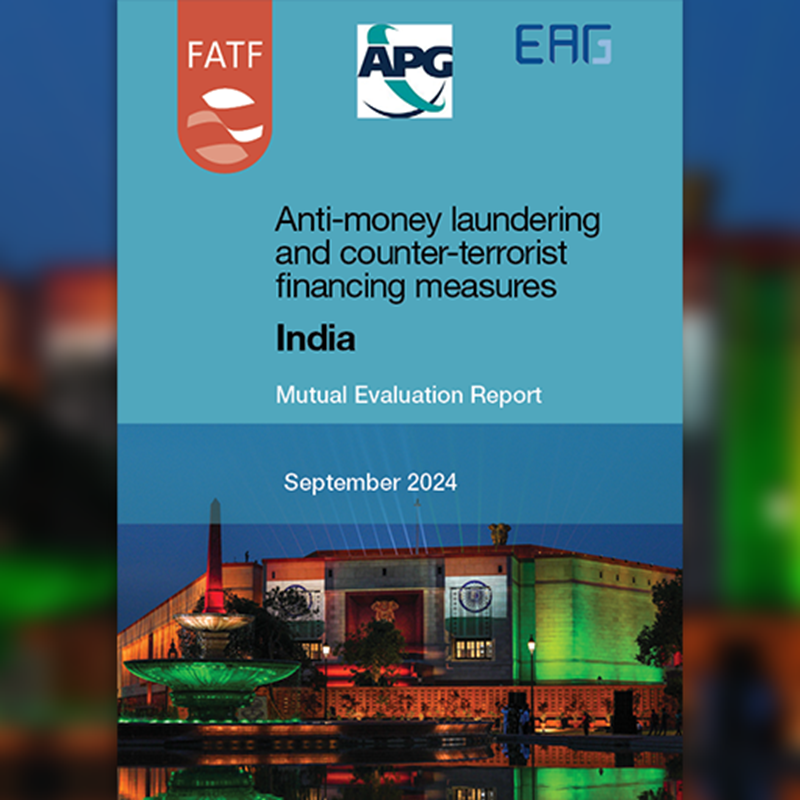- Courses
- GS Full Course 1 Year
- GS Full Course 2 Year
- GS Full Course 3 Year
- GS Full Course Till Selection
- MEP (Mains Enrichment Programme) Data, Facts
- Essay Target – 150+ Marks
- Online Program
- GS Recorded Course
- NCERT- First Ladder
- Polity
- Geography
- Economy
- Ancient, Medieval and Art & Culture AMAC
- Modern India, Post Independence & World History
- Environment
- Governance
- Science & Technology
- International Relations and Internal Security
- Disaster Management
- Ethics
- Current Affairs
- Indian Society and Social Issue
- CSAT
- 5 LAYERED ARJUNA Mentorship
- Public Administration Optional
- ABOUT US
- OUR TOPPERS
- TEST SERIES
- FREE STUDY MATERIAL
- VIDEOS
- CONTACT US
FATF Recognizes India’s Progress in Combating Illicit Finance
FATF Recognizes India’s Progress in Combating Illicit Finance
The Financial Action Task Force (FATF) has released its Mutual Evaluation Report on India, highlighting substantial progress in combating illicit finance. The report was adopted during the FATF plenary in Singapore (June 2024), placing India in the "regular follow-up" category—an acknowledgment of high technical compliance with FATF standards.
Context:
- India is the only major economy with a federal structure to achieve the "regular follow-up" status.
- Other G-20 countries in this category include the UK, France, and Italy.
Key Highlights of the Report
Areas for Improvement
-
Non-Profit Sector Risks:
- Implementation of measures to prevent the non-profit sector from being abused for terrorist financing must align with a risk-based approach.
- Outreach to non-profit organizations regarding their risks is essential.
-
Politically Exposed Persons (PEPs):
- Enhanced measures are being applied to PEPs, but there is a lack of coverage for domestic PEPs from a compliance perspective.
- Full implementation of requirements by reporting entities is necessary.
-
Non-Financial Sector and Virtual Assets:
- Early stages of implementing preventive measures and supervision in these areas.
- Urgent need to improve cash restrictions in the precious metals and stones sector due to its significant role in the economy.
Money Laundering Risks
- Primary sources include fraud, cyber fraud, corruption, and drug trafficking.
- Precious metals and stones (PMS) sector vulnerable to money laundering due to large transaction volumes without ownership trails.
- Only 9,500 out of 175,000 PMS dealers are registered with the Gems and Jewellery Export Promotion Council (GJEPC).
- Criminal networks in the PMS sector are under-investigated; ongoing monitoring of fraud and smuggling techniques is essential.
Terrorist Financing Threats
- Significant threats from groups like ISIL and Al-Qaeda, particularly in Jammu and Kashmir.
- Regional insurgencies and Left-Wing Extremist groups pose additional risks.
- More efforts required to conclude prosecutions against terrorist financiers.
Financial Inclusion
- Increased bank account holders and digital payment usage, supported by the Jan Dhan-Aadhaar-Mobile (JAM) initiative.
- Implementation of Goods and Services Tax (GST) has enhanced supply chain transparency.
Action Against Terror Financing
- Acknowledgment of effective actions by the National Investigation Agency (NIA) and the Enforcement Directorate.
FATF’s Recommendations
- Expedite pending money laundering trials; improve handling of human trafficking and drug-related offences.
- Enhance frameworks for targeted financial sanctions to ensure timely freezing of funds and assets.
- Define domestic PEPs under anti-money laundering laws and implement risk-based measures.
Implications of FATF’s Mutual Evaluation for India
- International Collaboration and Asset Recovery: Enhanced ability to cooperate in tracking illicit assets, benefiting cases involving fugitives like Vijay Mallya and Nirav Modi.
- Improved Access to Global Financial Systems: Better access to global financial markets, facilitating investments and borrowing from international institutions.
- Strengthening Investor Confidence: Positive evaluation boosts India’s credibility, enhancing foreign direct investment (FDI) attractiveness.
What is The Financial Action Task Force (FATF) ?
Origin:
Members: India became a member of the FATF in 2010.
* FATF suspended membership of the Russian Federation on 24 February 2023 FATF's Lists: Grey List and Blacklist:
Blacklisted Countries:
Consequences of Being Blacklisted:
Grey list countries :
Consequences of Being Greylisted:
|
Conclusion
The FATF Mutual Evaluation Report is a significant milestone in India's fight against illicit finance. It positions India as a leader in anti-money laundering and counter-terror financing efforts, setting a benchmark for other nations. However, continuous improvements, particularly in areas like NPOs and PEPs, remain crucial for sustaining progress and fostering international collaboration.
Must Check: Best IAS Coaching In Delhi
UPSC Prelims Result 2024 Out: Expected Cut Off & Other Details, UPSC Prelims 2024 Answer with Explanation, Daily Prelims Quiz, Daily Current Affairs, MONTHLY CURRENT AFFAIRS TOTAL (CAT) MAGAZINE, Best IAS Coaching Institute in Karol Bagh, Best IAS Coaching Institute in Delhi, Daily Mains Question Answer Practice, ENSURE IAS UPSC Toppers, UPSC Toppers Marksheet, Previous Year Interview Questions, UPSC Syllabus





